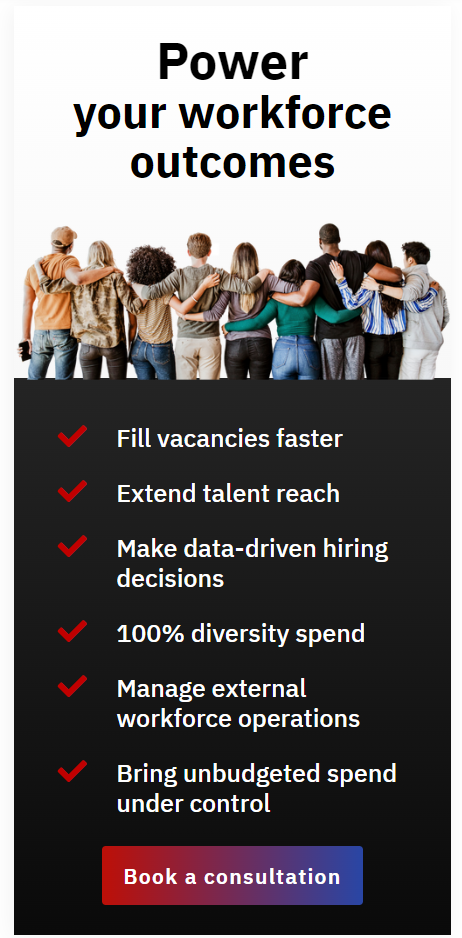About This Article
The Workspend Managed Service Provider (MSP) program approach is continuously improving. While it’s been around for years, many organizations have still yet to install control and governance across their contingent workforce supply chain. Many early adopters of MSP have been disappointed by the slow pace of returns after an initial honeymoon period. The fact is it makes sense to install an MSP to achieve cashable economies, bring transparency to contingent workforce management performance, reduce risk, and improve hiring performance. The purpose of the article is to expose the attributes of the next-gen MSP program we run at Workspend; to share how MSP is evolving with the times.
The New Mantra for Contingent Workforce Management
“If you can learn a simple trick, Scout, you’ll get along a lot better with all kinds of folks. You never really understand a person until you consider things from his point of view, until you climb inside of his skin and walk around in it.”
Atticus Finch in To Kill a Mockingbird
A Contingent Workforce Management Program (CWMP) is a High Concept and a High Touch Solution that requires merger of Technologies, Processes and “Behavioral Skills”. Most of the different aspects like the job catalog, approvals, requisition distribution, invoicing and so on can be addressed very well by a Vendor Management System (VMS), which is the best option for process management and also integrating with different systems like SAP Ariba, Oracle, Workday etc. This allows for one platform for managing an Organizations Contingent Workforce needs. It is considered a “High Concept” solution due to the complexity involved in technical integrations, contract and rate negotiations with suppliers, taking global and local workforce regulations and other aspects into account, which require a high level of expertise in each of the areas for the program to work well.
For a Successful CWMP, the High-Tech abilities of a VMS are supplemented by “High Touch”. The high touch is exemplified by Empathy which is required for building of trust between the Managed Services Provider (MSP) Program Office and the various end users of the Program which include the Hiring Managers (HMs), Suppliers, Contingent Workers (CWs) and other internal and external stakeholders with the client. Empathy is the most important and often underrated aspect in a CWM Program. Empathy does not get its due recognition in the information age. It is one aptitude that has so far, been impossible to produce by computers. Empathy allows the RC to stand in the shoes of a HM, and intuit what the HM is thinking, to experience the world from their point of view.
The MSP team is usually known as the Program Office or PMO, and consists of Program Managers, Recruiting Consultants (RCs) and Logistics Specialists. One of the key duties of an RC is usually is to interact with the HMs to understand their CW needs and requirements and then share those with the suppliers supporting the program, along with information like the rates, locations etc.
As with full time employees, HMs looks for skills, how well can they work independently, team and corporate fitment with CWs. Majority of the HMs are not used to interviewing CWs any differently even though the assignment might be as short as three months. This is where the RC should be able to work with the HM while creating the request, to set the expectations and help them think of the talent required in a short term solution basis: prioritizing the ability to adapt and deliver quickly and have a high skill level – focus, for example on a three month deliverable as opposed to prioritizing a team and corporate fit.
“When I get ready to talk to people, I spend two thirds of the time thinking what they want to hear and one third thinking about what I want to say.”
Abraham Lincoln
The challenge now will be to establish the same level of relationships with the many stakeholders, over the phone or video and web conferencing. The simplest interaction between people requires several different tasks: Interpreting what the other person is saying, reading their facial expressions and body language, responding and thinking whether you have been understood or perhaps it’s time to make an exit. Now imagine doing that over a video call, one in which you must make an impact, as the performance of the program, the client’s business objectives and a CWs potential livelihood: all depend on how constructive and productive the remote conversation is.
Empathy is a means of understanding others; it allows us to connect with people from different cultures, countries, and expertise. With the current scenario, most of us are working remotely. And we can expect this to be the new normal for the foreseeable future. The MSP organizations can help their program teams by providing training and guidance to the PMO, helping them to service the client better. The new age, post-COVID-19, is going to be an age of connecting with others remotely:
Remote + Empathy = Rempathy
We will need “Rempathy” to create another kind of revolution, one that is based on the evolution of human relationships without the human touch and uses technology to bridge the gap between thoughts and emotions.
The first step towards building trust over the video call, also requires empathy. The RC and other PMO team members should speak softly and politely, addressing the HM with due respect. As the HM also cannot study the RC’s body language, the RCs should go out of their way to make the HM comfortable, and focus on listening to “understand” and not just to “reply”. The understanding of both the explicit and implicit requirements in the new candidate are very important as well and the HM might need help in articulating the skills that they are looking for, to strike a balance with the organizational requirements and the expected communication and technical skills of the CW.
“No one cares how much you know, until they know how much you care.”
Theodore Roosevelt
The HM should realize at this point that the MSP is making an effort to overcome the communication barriers and be more receptive. The RC must prepare for the call: research on the previous roles that the HM might have hired for, the types of roles that the HMs Business Unit usually hires, be ready with market intelligence, and any new regulatory updates. The RC should be able to address any questions the HM has in detail and if required, get back to the HM later with any information that they might have asked for. This will go a long way in establishing trust with the HM and displaying the MSP’s professionalism. All of the aforementioned actions offer a great opportunity to the RC to establish trust and build a great relationship, all this will have to be done using technology as the medium of communication and “Rempathy” as the tool of choice.
“Learning to stand in somebody else’s shoes, to see through their eyes, that’s how peace begins. And it’s up to you to make that happen. Empathy is a quality of character that can change the world.”
Barack Obama


